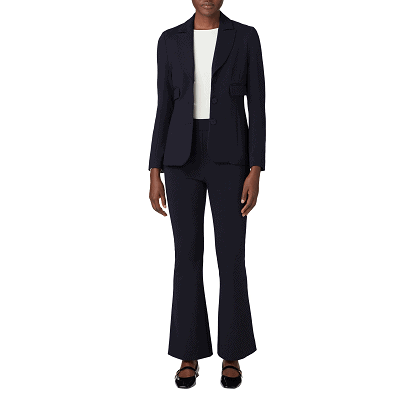This post may contain affiliate links and Corporette® may earn commissions for purchases made through links in this post. As an Amazon Associate, I earn from qualifying purchases.

For busy working women, the suit is often the easiest outfit to throw on in the morning. In general, this feature is not about interview suits for women, which should be as classic and basic as you get — instead, this feature is about the slightly different suit that is fashionable, yet professional.
If you used to be a fan of British brand GOAT, they've changed their name to Jane Atelier! They're still making lovely dresses and suits. This dark navy jersey jacket looks like a great basic.
The jacket is £495, and the matching pants are £280.
(Side note: What do we think about the bootcut pants hemmed at that length, and paired with those shoes? I would argue that they look too long to be “ankle pants” but are too short to be proper bootcuts, which I think of as having a slight break over your foot, and covering all but the bottom 0.5″ or so of the back of your shoe… I'd also argue that this is why pointy or square-toe shoes generally pair best with bootcuts from a style perspective.)
This post contains affiliate links and Corporette® may earn commissions for purchases made through links in this post. For more details see here. Thank you so much for your support!
Psst: looking for more basic mid-range suits? Here are some of our favorites…
Some of our favorite mid-range suits for women (which sometimes have such frequent sales that they come down to the same range as our “budget” suits) include Ann Taylor, J.Crew, Talbots, Banana Republic, Brooks Brothers, and Antonio Melani. (Talbots and J.Crew usually have plus sizes, and the others offer petites.)





Sales of note for 7.19.24
- Nordstrom – The Nordstrom Anniversary Sale is now open to everybody! Here are all of our picks, and here are reader favorites.
- Ann Taylor – Semi-annual sale, extra 50% off markdowns + 20% off everything!
- Banana Republic Factory – 40-60% off everything, take an extra 20% off your purchase
- Eloquii – 50% off select styles
- Everlane – Up to 70% off
- J.Crew – End of Season Sale, extra 50% off sale styles
- J.Crew Factory – 40-60% off everything
- Lo & Sons – Summer sale, up to 50% off
- Madewell – End of season sale, up to 70% off with code.
- M.M.LaFleur – Save 25% sitewide. (Please correct me if I'm wrong, but I think this is the biggest sitewide discount I've ever seen…)
- Rothy's – Lots of great finds in the “final few” section
- Talbots – Semi-annual red door sale, extra 40% off markdowns
Sales of note for 7.19.24
- Nordstrom – The Nordstrom Anniversary Sale is now open to everybody! Here are all of our picks, and here are reader favorites.
- Ann Taylor – Semi-annual sale, extra 50% off markdowns + 20% off everything!
- Banana Republic Factory – 40-60% off everything, take an extra 20% off your purchase
- Eloquii – 50% off select styles
- Everlane – Up to 70% off
- J.Crew – End of Season Sale, extra 50% off sale styles
- J.Crew Factory – 40-60% off everything
- Lo & Sons – Summer sale, up to 50% off
- Madewell – End of season sale, up to 70% off with code.
- M.M.LaFleur – Save 25% sitewide. (Please correct me if I'm wrong, but I think this is the biggest sitewide discount I've ever seen…)
- Rothy's – Lots of great finds in the “final few” section
- Talbots – Semi-annual red door sale, extra 40% off markdowns
Some of our latest posts here at Corporette…
And some of our latest threadjacks here at Corporette (reader questions and commentary) — see more here!
Some of our latest threadjacks include:
- Is there a mantra or slogan that will help me combat imposter syndrome?
- AITA for not moving to the middle seat to be closer to my husband on a recent flight?
- What are your latest favorite nonfiction books for fans of Mary Beard?
- I'm so annoyed by people who look at their smart watches instead of paying attention to our conversation…
- Let's have a secrets thread…
- I need tips on managing employees in BigLaw who have to leave for daycare pickup…
- I'm thinking of leaning out to spend more time with my family – how can I find the perfect job for that?

Anon
I know that GOAT was a favorite of Kate Middleton but I can’t see her in this suit. I am one who does not understand how to wear clothes in 2021, but I agree that the leg cut and hem length make me question all of my possible shoe purchases. OTOH, previously we all saw pictures of suits with two-band sandals, so who really knows?
anon
This suit is very MEH and the pants are way too short IMO!
Senior Attorney
Yeah, but at least the shoes are super frumpy!
Anonymous
And this suit is made of jersey? No way.
Anon
I had a jersey suit once (from Pendleton) and it was the bomb. I think I never got back to that size after babies, but it was the most awesome suit. I had forgotten about it until now. Sniff. I miss the good suits.
Anon
if you need a good laugh, go read the ask a manager post about the office turtles
Anonymous
Honestly, I wish Alison would stop printing so many obviously fake stories – it kind of sucks the humor out when you know it’s not real. If they’re not fake, they’re SO niche that the advice just isn’t applicable. I loved the site in the early days and I’m so grateful for the cover letter advice I got from her once, but it’s been a long time since I found her posts useful. The readers can also be a little…out of touch.
Cat
Same. I wish she would post less!
Anon
She has definitely jumped the shark. I quit close to two years ago, and anytime I stumble across her reprints on Inc and the like, it’s pure nonsense.
Anon
I used to read daily and stopped years ago. All the letters are so over the top and the commenters there are so afraid of every social interaction.
Anonymous
They really are!! It’s baffling.
Anon
She hasn’t actually worked in an office in years which is why her advice is so outdated now.
Senior Attorney
*snort*
People are just crazy, man.
anon
That story seemed too weird to be true.
Anonymous
I worked an an environmental NGO and I can totally see my ex-boss doing something like that.
Anon 2.0
While I hope it is too weird to be true, offices can be crazy, weird, strange places. Truth, alas, is often stranger than fiction.
Not exactly the same, but if you’ve ever worked with the general public you cannot even make up some of the odd things people do.
Anon
+1 truth is stranger than fiction. I believe it.
Anon
Did not read the post, but this reminds me of when an associate brought a kitten to the office, but pretended that there was no kitten. When people could hear the kitten.
BCP Disposal?
What’s the proper way to dispose of bcp? I was sent some a while ago for the wrong medicine and could not return them. Now it’s like 2 years later, and I found them in the bottom of a drawer during de-cluttering.
Anon
Police stations often have organized drug take back events. I always get rid of old medicines there.
anon
CVS and Walgreen’s also often have disposal boxes.
Anonymous
The trash
Vicky Austin
Call your local pharmacy.
Anon
Our disposal boxes got closed for COVID so I took some old medicine containers and put the meds in them and some water and some vinegar to dissolve everything and then shut them let things dissolve. Then I poured the mix out into a bin of paper from the shredder and then put that in with some other nasty trash. The meds would have had street value (not BCPs) and this way really couldn’t have been reconstituted or used, which was my concern. I guess with BCPs it’s getting into the water supply?
OP
That’s my main concern. The hormones getting into the water supply. Now that I think of it, I have some antibiotics too
I don’t have any meds of street value, but nothing I really want in the landfill.
I’ll check local pharmacies.
anon
believe it or not, BCP are pretty good fertilizer for your house plants. I worked at Planned Parenthood in college and this was what we did with expired pills (just buried them in our office pothos plants – they gradually dissolve when you water the plants). The nurses took them home for this purpose as well (we had a lot of plants, but a LOT of expired pills sometimes).
Anonymous
Um…don’t do this. See above about pills affecting the water supply, not to mention animals and insects.
Anon
She said HOUSE plants or OFFICE plants… not outdoor plants.
Anon
Supposedly trash is most environmentally friendly. You already excrete a lot of the hormone into waterways just by taking bcp , though still better not to flush, and the pollution impact of transport and and incineration ends up being worse than just trashing. This could differ if meds could be abused, though.
https://www.npr.org/sections/health-shots/2012/05/17/152947334/trash-can-may-be-greenest-option-for-unused-drugs/
Not a lawn but a ???
Any ideas for how I can help my mom convert her suburban lawn to a low maintenance, water-saving landscape design? I’m sure there are specialty consultants for this, but most of what I’ve found via Google is waaayyyyy too fancy for what she wants. I don’t think I even have the right words to effectively find what I’m trying to search for.
Context: She lives in the intermountain west, gets lots of sun & heat in the summer, and snow + below 0°F in the winter. She lives in a suburban style development, with green lawns galore. She also has decided that she hates her in ground sprinkler system and how much water it uses (she is right about the waste & $$$, it definitely isn’t water saving). So she just…stopped using it last year. Of course, now her yard looks pretty ragged, and eventually the grass will stop growing back. If it gets bad enough, her HOA will probably throw a fit.
So she needs something low maintenance and water saving, and that will look reasonably acceptable to the neighbors. She’s in her late sixties and while she likes growing veggies in her backyard, she just DGAF about how the front yard looks, other than not wanting HOA drama. Basically once it’s set up, she doesn’t want to have to spend a lot of time and money on it.
She’s asked for my help making the transition away from dried-out-lawn to something intentional (albeit after I pointed out how much she hates HOA drama). But I don’t know how to find the person/resources/etc she needs to make the transition. Any suggestions and ideas are very welcome!
Agurk
Most regions have specialist non profits that offer this kind of info. Google xeriscaping + your region. They won’t design it of course but they will offer plant lists etc.
Also this kind of yard does require watering and a little maintenance until it’s established. So plan on 2-3 years more watering and then she should be set.
Not a lawn but a ???
Thank you!!! I knew there was a word and I could not for the life of me find it. Xeriscaping!
anon
If there is a local-ish university they might also have advice on native low water plants. In the drought stricken Bay Area, the municipal water companies also often have lists of low water plants and inspiration.
Aunt Jamesina
Yup. Look up your state university’s extension office. They provide a wealth of information and help!
blueberries
Good for your mom! We need more people to have landscaping suitable for the region.
I live in California and there are loads of local resources on low water need yards, from people/firms that redo landscaping, to information sessions at the library/community center, to sections of the library.
A local garden store might be able to recommend someone to help select plants and do the install. Does the state university offer an extension service for gardening advice? Or, try local FB/Nextdoor gardening groups.
Anonymous
“xeriscape” is the word you want. When I lived in the intermountain west, we had a local display garden that featured xeriscaping and demonstrated plants that would grow well in the area. Check out the county extension service for her county; they often have plenty of garden resources available, and sometimes even have master gardeners who can help with this kind of thing.
BeenThatGuy
Looks like you’ve got some good responses. I’d add that before you do anything, I’d suggest checking with the HOA to make sure they don’t have specific lawn requirements. The town I lived in once denied me a certificate of occupancy because they required “green grass” prior to giving a CO on new construction. Obviously, that wasn’t an HOA thing, rather a bizarre, and ridiculous, town requirement.
Not a lawn but a ???
Ohhh good point, thank you. I think the requirement is just that the yard be “well maintained” but we will double check.
Anon
Hello from drought-stricken Nor Cal. My local water district (EBMUD) sometimes will even pay for part of your new drought tolerant landscaping, so definitely look into it.
To replace a lawn you are eventually going to do some or all of these steps.
1) get rid of the grass.
2) put something down where the grass used to grow to keep it from growing back (weed cloth, lasagna mulching, or just super thick layers of mulch, which can get expensive fast)
3) set up a drip watering system that can be expanded upon. Only add emitters where you’re going to add plants
4) buy and plant drought tolerant plants at each emitter or dripper
Drought tolerant plants will need some help getting started so more water until it rains, then see how they do next spring. Your local nursery will be able to guide you on this.
A drought tolerant garden is usually not going to have green groundcover. You really are going to need something to prevent weed growth between the plants you want and that tends to be some sort of mulch like wood mulch, rocks, or even pavers. My neighbors did decomposed granite but had to have pros come and install it. It looks nice but still sprouts weeds.
Drought tolerant plants don’t need to be cactuses and succulents! Plenty of drought tolerant plants (once established) have beautiful seasonal blooms, if you like blooms.
There are lots of picture books specializing in drought tolerant plants that your mom could look at to get an idea of what she likes and what might work in her ‘hood
Anon.
My first search for resources and services would be the state and county Extension Office which is generally operated through the state land grant university. Generally they have tons of gardening and landscaping resources. They will be specific to her area.
Agurk
Hello everyone…posting here because I can’t IRL. I just quit my job! Still shaking from the adrenaline but hallelujah. Now I have two weeks notice and two weeks off before the new one .
Clementine
WOO HOO! Congratulations!
I vote that you have takeout and a glass of champagne (or sparkling cider) to celebrate.
Vicky Austin
Way to go!! Friday is my last day at my awful toxic job and I’m so happy to be on my way out! Clink clink go the flutes!
Agurk
YAY. Congratulations to you too!
Anon
Oof! From what you’ve posted, that job did not seem worth it. Congratulations!
Senior Attorney
Woo hoo! Congratulations!
Anon
Congratulations!!
Minnie Beebe
Where is “Shots! Shots! Shots!” when you need her? Congrats! Enjoy the down time, Agurk!!
Agurk
Thanks everyone!!
Anon
Congratulations! On to better things!
Anon
Congratulations!
Piper Dreamer
I am burnt out. Biglaw/7th year corporate associate. I actually love what I do but I just can’t bill 200+ per month anymore. I am the go-to person for a few big clients and manage the relationship there. I have been told that I’d make partner in 2 years (not BS as far as I can tell) so I really just need to hang in there. But I can’t anymore. We have lost 4 juniors (3rd-5th years) since March. I am being told to just take on more training duty and keep training the new people when I am drowning in work.
WWYD? Would you look for a new job or would you stick it out until partner?
Anon
Is there a partner you trust?
I would go to them with your calendar. Like your REAL calendar and/or what you billed. And just say that your priority is keeping the clients happy and you want to flag the fact that you’re running out of hours in the day without more support. Make a business case for why you need more support (can you get a solid lateral? can a peer from another group assist with some review functions?) by framing it as you making sure that the clients stay happy.
Daffodil
+1000 to all this.
Anon
Will things actually get better when you’re a partner? If you really expect things to improve then sticking it out two more years seems worth it. But that whole “it’s a pie eating contest where the prize is more pie” thing would make me think your work life is not going to change much post-partnership. In particular, being the go-to for clients and always being on call for them is only going to get worse, right?
Anonymous
Oh hi, me from 3 years ago. I had this same problem and, uh, dragged my feet on looking for a new job and then made partner. And now even more people have quit and we’re still not hiring. But I’m a partner yay (?)
Anon
Are you me? Because I am doing my work and also the work of the very good 5th year and the very good 7th year and the OK and useful but maybe not partner material third year who left, but not getting paid their salaries. This is nuts. I am glad I am a fast typist b/c I do that, too. OMFG make it stop.
Anonymous
Stick it out, meet with the laterals to figure out what each already can and can’t do, give each assignments to suit their strengths to see what they can do, and then if you find which are good fits, grab them and start training just those to help you.
Piper Dreamer
Thanks all. I don’t make lateral hiring decisions and despite my repeat request, we only have had one lateral hire (who is not great). Good question whether my life will get better after making partner. I don’t know. I am hoping it will, at least I can have my own work flow and make my own schedule?
Senior Attorney
Years ago somebody told me that the partnership track is like a pie-eating contest where the prize is more pie. Turned out to be totally true!
Anon
Not sure about that … won’t the client demands replace the partners in making your work flow and schedule? It may make sense to grit it out at this point of it will help you get other jobs you want, biglaw partner is certainly a big star to have, but I wouldn’t kid yourself that your life will improve.
Anon
Is anyone else someone who had no allergies as a kid but is now just a sneezy outdoor allergy person 24/7?
I get the feeling that people with food allergies have them from day 1, but am realizing that as a layman, I am confused how I am “becoming” a person with allergies. I know I never took Sudafed or benadryl as a kid or teen. Now, I am like the Queen of Mucinex and other meds (thankfully OTC now).
And are there any good books for laymen on allergies?
Anon
It’s not uncommon at all. Increased exposure makes allergies worse (it’s your immune system overreacting, so the more it’s exposed, the more it reacts, essentially). Different climates also have different allergens, so things can get worse the longer you live in one place. It’s basically unheard of for children under 3 to have seasonal allergies and many people don’t experience symptoms until adulthood. Food allergies are different as you note and usually appear in early childhood.
Anon
I’ve had them on and off for pretty much ever, with fairly long stretches of no symptoms. Bodies are weird! Over the years, I’ve gotten to know what works well for me (Tavist, Zyrtec), what doesn’t (Chlorpheneramine, Claritin) and when to take what. Also, the point at which I’m done with OTC options and need to see the doc, which thankfully hasn’t happened in a long, long time. It’s a lot of getting in tune with your body. Things are better now that there are lots of really good meds available OTC now. A lot of it really is down to trial and error. What works for me, may not be effective for you.
In general, though, take meds before you’re a sneezy, miserable mess. Avoid alcohol – that makes symptoms worse and can cause non-drowsy allergy meds to not be. Shower every day when allergies are bad, including washing your hair. Chap stick and good, soft kleenex are your friends. If you work out hard, maybe stay away from allergy meds with pseudoephedrine (anything called AllergyMed – D that they keep behind the pharmacy counter) in them. You HR skyrocketing during a run is a pretty terrifying feeling. Again, your experience may vary – bodies do weird things sometimes.
Horse Crazy
Yes. I got allergies in college all of a sudden, and now I have them like every other week, all year. Ugh.
AIMS
I never had any allergies and then in my early 20s I developed ‘regular’ allergies which also turned into some food allergies in my mid twenties and then expanded to include more food in my late 20s (oral allergy syndrome, so at least nothing life threatening so far).
Anyway, sadly it’s possible and actually quite common according to my allergist. I take a Zyrtec before bed most days now and it seems to manage it. Multiple doctors have told me that there is no harm from it so here’s hoping.
PolyD
Never had allergies much as a kid, got wicked pollen allergies in grad school, mostly in late summer-early fall. This switched to spring AND fall when I moved to DC.
Now I have some allergies in spring, but they’re not as bad as they were. I also developed an oral allergy to apples, cherries, and some other stone fruits when I was about 40, but found that last year, the apple allergy kind of went away. I can eat an apple without getting an itchy mouth, but if I eat one several days in a row, I get a little queasy.
So yeah, things can change.
Yep
Not just you. I developed seasonal allergies in my 40s, mostly to pollen. It takes me by surprise every year, but yes, I need a daily Claritin/Zyrtec/whatever each spring through early summer.
Vicky Austin
I don’t remember having allergies as a kid, but my mom swears I have had irritated eyes and nose in August my entire life. I remember it getting really bad around the age of 15 and these days I have to take both OTC and prescription allergy pills + prescription nasal spray + OTC and prescription eye drops to not be a sneezy, sniffly, blinded mess.
Anon
My allergies all developed in adulthood, including my life threatening allergy to bee and wasp stings. I think that’s fairly typical, or at least the doctor I saw for testing didn’t seem terribly surprised.
I also have nose-drippy “seasonal” allergies that seem to last year round. I saw an ENT who switched me from over the counter Nasonex to Ipratropium nasal spray (after my PCP tried Azelastine, which didn’t help at all) and it’s much better now. I read that it’s meant for the lungs, so maybe she’s using it off-label for the allergies, but it totally did the trick after seriously several years of a constantly drippy nose.
Anon
Both ipratropium and azelastine are approved for non-allergic rhinitis, which typically develops in adults and can co-exist with allergies or be present in people without allergies, but often causes the year round runny nose. I had the same experience as you- azelastine didn’t help at all, but ipratropium helps a lot. My nose still runs a lot, but it’s more like a drippy faucet than the constant stream it was before!
Anon
Thanks! That’s very helpful.
Yes, my nose runs a lot less. I even leave the house without a mini-pack of Kleenex in my bag!
Anonymous
I swear by the raw local honey regimen, if you have grass allergies.
Aunt Jamesina
Yup. I never had any allergies until my twenties, and I’m now allergic to ragweed and pollen. Apparently environmental allergies are being exacerbated by climate change, which is just GREAT: https://www.climate.gov/news-features/climate-and/climate-allergies
Anon
Yeah I’ve had allergies for a long time, since I was a teen or maybe preteen, but they’re definitely getting worse every year and my doctor said it’s because of climate change.